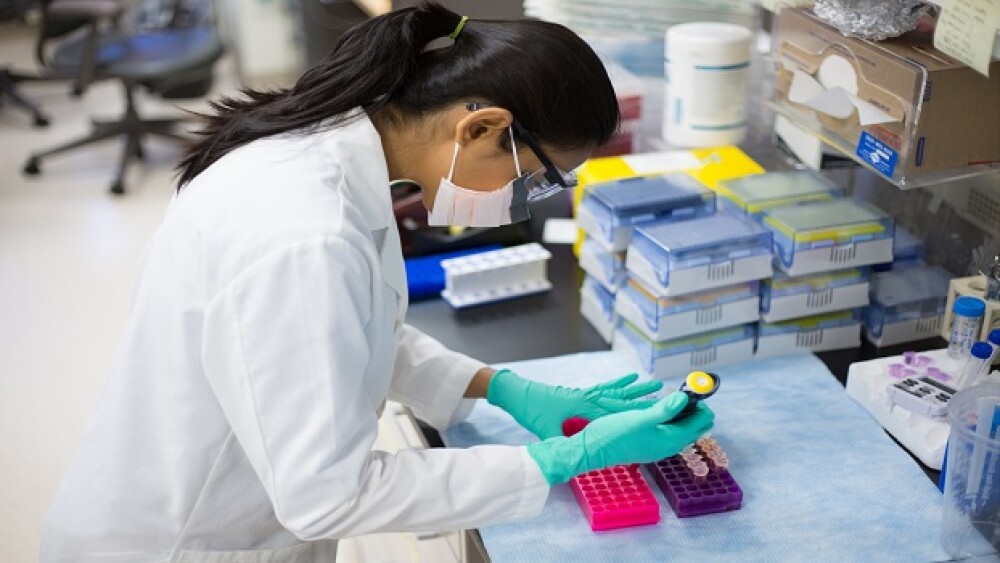Vyriad, based in Rochester, Minnesota, announced it is building out its facility in 25,000 square feet of space it is leasing on the IBM Campus in Rochester.
Vyriad, based in Rochester, Minnesota, announced it is building out its facility in 25,000 square feet of space it is leasing on the IBM Campus in Rochester.
The plans call for offices, laboratories and a Good Manufacturing Practice (GMP) facility. At the plant, it will manufacture clinical-stage oncolytic virus therapies for cancer.
The building is financed by a recent $9 million secured convertible note financing, with participation by Mayo Clinic, Rochester Area Economic Development, and the Southeast Minnesota Capital Fund. The state of Minnesota and the city of Rochester have committed $370,000 in funding for equipment.
Oncolytic viruses are a relatively new modality for treating cancers, related to immuno-oncology approaches. The uses of viruses as therapeutics is growing, largely because new gene therapy treatments require viruses—typically adeno-associated virus (AAV) as a vector for delivering the modified gene into the patient’s body. For example, Spark Therapeutics and Pfizer’s SPK-9001 to treat hemophilia B uses AAV to deliver a human factor IX variant into cells, allowing them to produce the factor IX. It is currently in Phase III clinical trials.
But another use of viruses as therapy is being evaluated as well. So far, there has only been one such product, Amgen’s Imlygic (talimogene laherparepvec), which was approved by the U.S. Food and Drug Administration (FDA)to treat unresectable cutaneous, subcutaneous and nodal lesions in patients with melanoma recurrent after initial surgery in 2015. Imlygic is a genetically modified herpes simplex virus type 1 that replicates within tumors and creates a protein that stimulates the immune system to attack the tumors.
These are called oncolytic viruses, and with a combination of advances in immuno-oncology and techniques like CRISPR gene editing, may be a promising new type of immuno-oncology treatment.
Vyriad has several oncolytic viruses in early-stage clinical trials. VSF-IFNbeta-NIS is in Phase I for solid tumors. There are several others in preclinical stages for non-small cell lung cancer (NSCLC), bladder cancer, HPV and head and neck cancers. It also has several investigator sponsored trials with the Mayo Clinic for endometrial cancer, multiple myeloma, T-cell lymphoma, acute myeloid leukemia, metastatic breast cancer and medulloblastoma.
Stephen Russell, Vyriad’s chief executive officer and a Mayo Clinic researcher, told the Post Bulletin, that a lot of venture capitalists interested in the company would only provide funding if it moved to places like Boston or San Francisco, the two largest biotech hubs in the country. “Despite the Destination Medical Center idea, I don’t think the investment community has bought into it. The real value of this company is to remain in Rochester connected to the engine, Mayo Clinic, where the technology was developed.”
Benikie Construction of Rochester is already working at the site and hopes to have it opened by the fourth quarter of this year. Once it’s completed, the existing employees, along with its related company, Imanis Life Sciences, will move into the site. There are currently about 20 employees. It is already recruiting about eight specialized employees to run the facility.
The company is currently in the Minnesota BioBusiness Center, but the new facility will get all employees in one location. “We greatly appreciate the strong support we have received from Mayo Clinic and at the local and state levels, and we look forward to continuing to work with Mayo Clinic in our mission to deliver important new therapies to patients as well as drive local bioinnovation and economic development in Rochester and Minnesota for years to come.,” Russell said in a statement.





